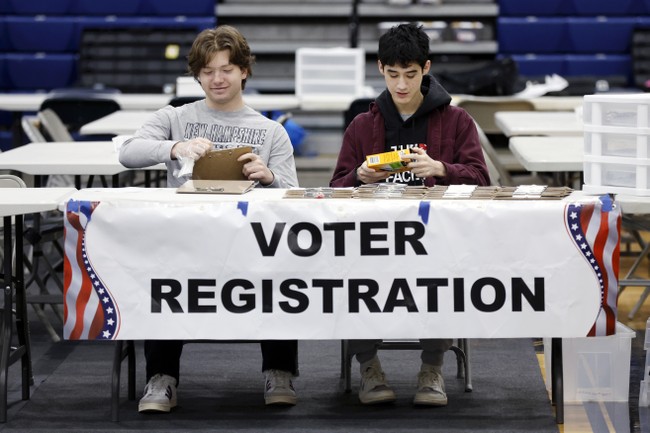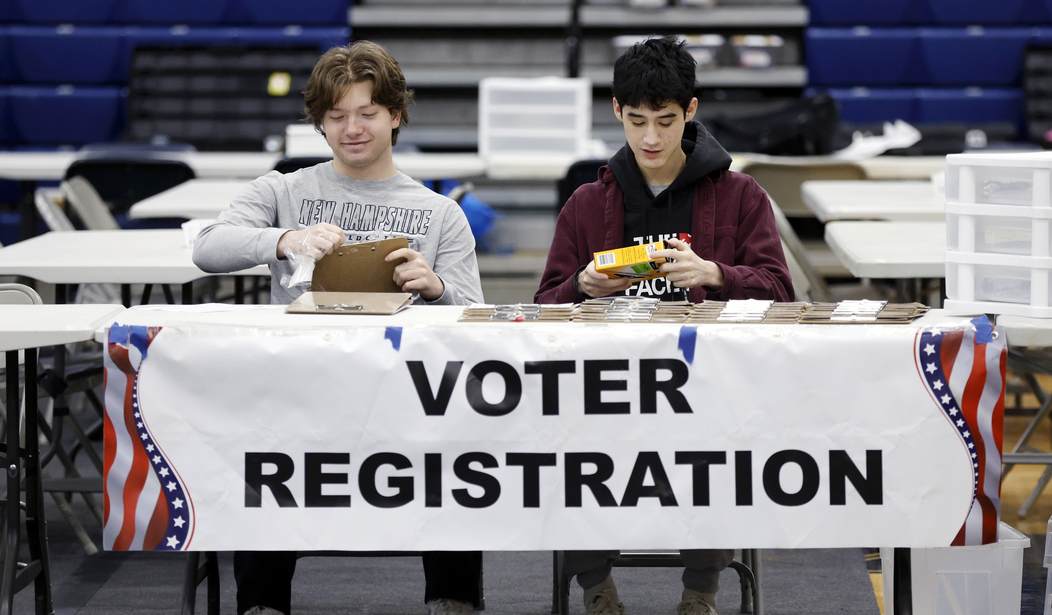Congress has a chance this year to close a glaring vulnerability in the American electoral system.
In April, the House passed H.R. 22, the Safeguard American Voter Eligibility (SAVE) Act, a bill that would require documentary proof of U.S. citizenship to register to vote in federal elections. The Senate has not yet taken it up, and time is running short if this reform is to be in place for the 2025 midterm elections. The surest way forward is to attach the SAVE Act to a so-called “must-pass” bill like the upcoming National Defense Authorization Act (NDAA) or an appropriations bill.
This is not a procedural gimmick. The tactic is a time-tested way to ensure necessary legislation reaches the president’s desk in the face of political gridlock. The SAVE Act passed the House in April with bipartisan support, but the Senate calendar is crowded, and Senate Democrats would rather filibuster it than pass it. Attaching the bill to a must-pass forces the Senate to decide whether maintaining voter integrity is as important as funding the government or equipping the armed forces.
The rationale for the SAVE Act is simple: In the United States, only citizens may vote in federal elections. Federal law already makes it illegal for noncitizens to do so. But the current safeguards are inadequate. Most states rely on an honor system, where registering voters simply attest to their citizenship by literally checking a box under penalty of perjury. Worse, federal law actually prohibits states from verifying citizenship of new registrants. While intentional fraud may be rare – but how would we know? – even a small number of unlawful registrations and votes can undermine public confidence, especially in closely contested races.
The SAVE Act would close the loophole by requiring documentary proof of citizenship to register to vote in federal elections. State election officials would verify the information using federal databases, creating a uniform standard nationwide. This is not about restricting access, it is about ensuring that only those entitled to vote in federal elections are on the rolls.
Opponents object that noncitizen voting happens so infrequently that it is statistically insignificant, and that allegations of noncitizen voting are largely driven by xenophobia. But public trust is not a statistical exercise – it’s a question of perception, legitimacy, and the willingness of voters to accept results. In recent years, doubts about election integrity have become one of the most polarizing forces in American politics. Whatever one’s view of the evidence, the perception of vulnerability is real, and a failure to address it invites more distrust. The SAVE Act offers a targeted, reasonable fix.
The timeline matters. The 2026 midterm elections will be conducted under rules and procedures set well in advance. Election administrators need time to update registration systems, train staff, and inform voters of new requirements. If the SAVE Act isn’t signed into law until late 2025 or 2026, implementation may be haphazard, or delayed until 2028. That would squander the opportunity to strengthen confidence in the electoral process before tens of millions of Americans go to the polls in 2026.
Because the timeline matters, the organization I lead, Tea Party Patriots Action (TPPA), will be launching a three-week bus tour during the August recess, kicking off in Garden Grove, California on August 18 and ending with a rally on Capitol Hill in Washington, DC on September 10, to build grassroots support for Senate passage of the SAVE Act.
For the Senate, the choice is clear: If a supermajority supports the principle that only citizens should vote in federal elections, then it should also support making that principle enforceable. If, on the other hand, members truly believe the current system is adequate, they should be prepared to explain to their constituents why they opposed additional verification.
The politics are favorable. Public polls – including recent polls conducted by McLaughlin & Associates for TPPA – show broad, bipartisan support for requiring proof of citizenship to register to vote in federal elections. Voters understand the concept intuitively. If you must show ID to board an airplane, cash a check, or even buy certain cold medicines, it’s not unreasonable to be required to show proof of citizenship to participate in electing the leaders of the world’s most powerful republic.
Congress faces no shortage of urgent business between now and year’s end. But none of Congress’s duties can substitute for safeguarding the legitimacy of the democratic process itself. The SAVE Act is not a partisan weapon; it’s a practical insurance policy against doubt and division.
The Senate should not let the clock run out. Senate leaders should attach H.R. 22 to an appropriations bill or the NDAA, pass it, and send it to the President before the end of the year. By doing so, Congress can ensure the law is in place and functioning smoothly in time for the 2026 midterms. The integrity of our elections is too important to leave to chance – or to Senate Democrats’ opposition.
Jenny Beth Martin is Honorary Chairman of Tea Party Patriots Action.
Editor’s Note: Do you enjoy Townhall’s conservative reporting that takes on the radical left and woke media? Support our work so that we can continue to bring you the truth.
Join Townhall VIP and use the promo code FIGHT to get 60% off your VIP membership!





